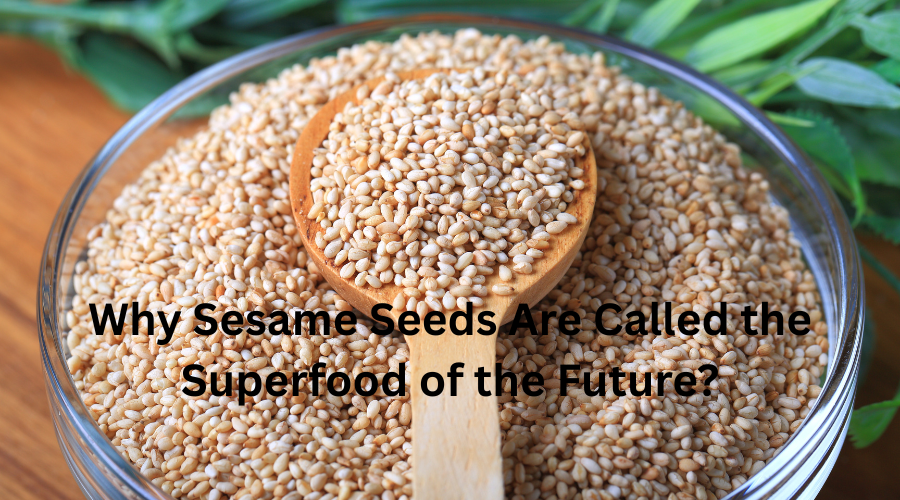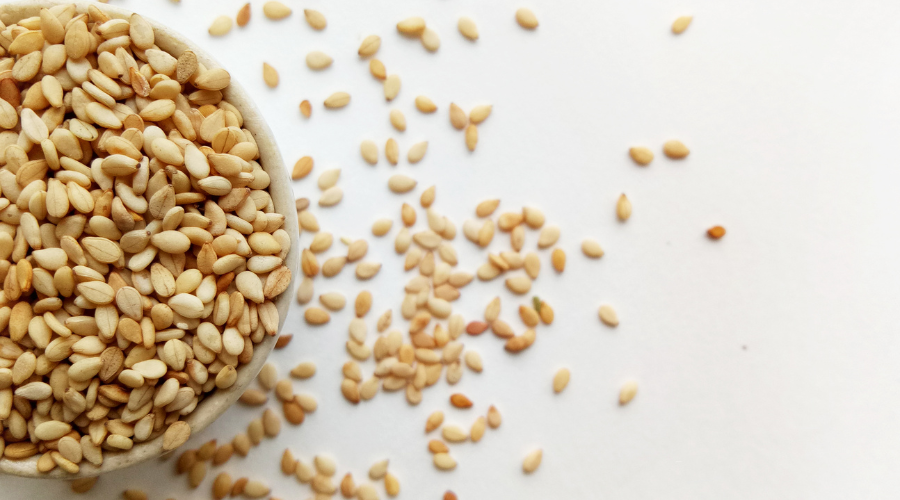Featured Articles
Burger buns with small seeds may not be a big deal, but the sesame seeds deserve significant consideration among nutritionists. These seeds have been used in cooking for thousands of years across various cultures, but today, there is great appreciation of their health benefits. Knowing the reasons, they should be given the label of a superfood reveals some neglected facts about this ordinary ingredient. Excellent nutrients Taking a spoonful of sesame seeds means absorbing all important minerals. It is available in white, black, and brown varieties, and each offers similar health benefits. The true distinction here is all the nutrition that goes in such a tiny size. The majority of the population lacks some nutrients in their daily diet. Some of these nutrient deficiencies are natural because sesame seeds can address them. This is why they have become increasingly prescribed by dietitians and other health professionals. Minerals That Matter Dairy products are the first thing that comes to mind when one talks of calcium, but the content of sesame seeds is impressive. A small serving will provide a significant portion of the daily calcium requirement. This is particularly important for individuals who are dairy-free and for others who require extra calcium. These seeds also provide the other necessary minerals. Magnesium aids the transfer of food into energy and normal muscle functioning. Iron helps the blood cells in the transportation of oxygen around the body. Zinc is responsible for increasing immunity, and copper promotes bone growth. It would be logical to get multiple minerals in a single food. Better Fats for the Heart Not all fats cause problems. Sesame seeds have polyunsaturated and monounsaturated fats, which doctors suggest one needs to consume more of. It has been discovered that these fats help regulate cholesterol when fed as regular meals. Sesame seeds contain two special compounds: lignans and phytosterols. There have been studies examining the impact of these on heart health, with promising results. These compounds can be added to food by adding sesame seeds, with no significant changes to the diet. Protection from Cell Damage Free radicals are unstable molecules that pose a constant threat to the cells. These threats are neutralized before harm is done with the help of antioxidants. Sesame seeds also carry certain antioxidants called sesamin and sesamolin, which are not likely to be seen in other foods. The black varieties exhibit greater antioxidant properties than the white ones. Sesame seeds have been used in ancient Asian healing techniques. Although some of these oriental applications were not scientifically verified, modern science has proven that they were not in vain. Protein Without Meat Vegetarians or persons who minimize the meat content in their diet require alternative sources of protein. The sesame seeds provide complete protein with all the vital amino acids, which the body is unable to form. Protein is required in every cell to make up and restore. Protein is used to produce enzymes that catalyze chemical reactions. The body's defenses are dependent on sufficient protein intake. The consumption of different sources of protein, such as seeds, provides a better-balanced diet. Steadier Energy Levels Consumption of food rich in refined carbs tends to lead to a spike and a crash of energy. The sesame seeds are not the same since they contain the elements of fiber, protein, and fat. A combination of these slows the absorption of sugar into the blood. The slowly rising and falling blood sugar levels sustain a steady energy level. The individuals do not get hungry in between meals, and they do not get afternoon slumps. This advantage is universal, but it is particularly significant for people who must be careful with blood sugar monitoring. Aiding in the Digestion Process Fiber is the best way to maintain a healthy flow in the digestive system. Sesame seeds contain fiber that aids in this. The seeds could also contain natural oils that could facilitate digestion. Good digestive health does not merely help a person feel good. This gut controls the immune power, clarity of the mind, and the ability of nutrients to be absorbed. This complex system is aided by the incorporation of food items rich in fiber, such as sesame seeds. Keeping Bones Dense and Strong Bones do not require only calcium; they require a combination of nutrients. The combination of these makes them useful to the health of the skeletons. Aging increases the concern about bone loss. Eating a variety of foods that support bone density is one way to help prevent future difficulties. Other non-dairy foods, such as sesame seeds, provide alternatives to individuals with alternative or limited dietary needs. Works with Different Diets The amount of gluten in sesame seeds is zero, and so safe even to those with celiac disease or those who are gluten-reactive. They can be consumed without any worries by vegans and vegetarians. Individuals on ketogenic or low-carb diets consider them acceptable since there is no significant increase in the amount of carbohydrates. Not many foods can be enjoyed in so many forms. Such flexibility is important in the attempt to accommodate healthier options that all would be happy to take, despite any dietary constraints or preferences. Easy Daily Use There is minimal effort in adding sesame seeds to the meals. One can sprinkle them on vegetables, yogurt, or any drink. A minute or two in a dry pan gives the seeds an even richer flavor. They can be used with breakfast food items, lunch, salads, and supper meals. No particular cooking skills or tools required. Expanding Conditions and Sustainability Compared to many crops, sesame plants are drought-resistant. They do well in the hot and dry environments where other plants fail. Water demands remain low compared to those of traditional agriculture. Global warming is a menace to food production. Plants that require less water and tolerate heat conditions have become even more significant. Sesame complies with these needs and offers healthy food. Meeting Future Food Needs The world population is on the rise, and the resources are experiencing pressure. It has become necessary to find foods that provide high nutritional value while reducing environmental resources. There should be plant-based alternatives that are efficient in growth. Sesame seeds not only tick several boxes but are also nutrient-rich, versatile, sustainable, and applicable to all kinds of diets. New benefits continue to be found in research. These attributes position sesame well for future applications. Conclusion It is reasonable to discuss Sesame seeds as a future superfood when analyzing their characteristics. They provide the essential minerals, good fats, complete protein, and protective substances. This entire nutrition is done in tablespoon portions. The difference in overall nutrition is 1-2 teaspoons a day. Any white, black, or brown seeds would do. As food systems move towards health and sustainability, it is the qualities of the sesame seed that would put it center stage in the human diet. Their extensive history with their current studies provides a strong argument for paying closer attention to these small seeds. FAQs What is the recommended amount of intake of sesame seeds? Sesame seeds are rich in nutrients, but they should not be overused due to their high nutritional value. Are the black sesame seeds superior to the white ones? The levels of antioxidants in black sesame seeds are higher, though the overall nutritional value is the same in both varieties. Is it possible to substitute dairy with sesame seeds as a source of calcium? Sesame is a good source of calcium and can be used to supplement foods high in calcium that meet daily requirements.
READ FULLSoybeans don't just look like a boring old bean at the back of your cupboard, they are little nutritional champions. They are protein-packed, healthy fats, fiber, vitamins and minerals, and can only be classified as 'superfoods' because they are so nutritionally dense. They're full of plant protein rivaling meat, more than enough unsaturated fats to promote heart health, and antioxidants to help your body deal with day-to-day wear and tear. You can use soybeans in a salad, drink them as soy milk, or snack on them straight out of the oven, but soybeans give your body a delicious and complete source of fuel. Soybean Salad: A Tasty Appetizer Salads are great for nutrition and can be prepared quickly and without hassle. So if you are in the mood for not filling yourself to the limit with a loaded dish, then the soybean salad made from organic yellow soybeans is a perfect choice. Not only is this dish vibrant and refreshing but it also has a delicious taste that appeals to the palate. Preparing this salad is a breeze, and it is great for having an instant meal at short notice. The initial step is to boil the soybeans till they become soft and tender. Then simply pop them into a mixture of raw veggies consisting of cherry tomatoes, cucumbers, bell peppers and onions. For a flavorful zing add fresh herbs like basil and parsley. After this, drizzle this flavorful mixture with lemon juice, olive oil, and mustard. For adding a more flavorful depth a touch of maple syrup or honey is great for that sweet contrast. The result is a salad that feels crunchy in the mouth and is also packed with an abundance of protein and fiber, which are the building blocks of general health. Soybean Curry: A Dinner Favorite For experiencing the full flavor potential of organic soybeans that really wows anyone, soybean curry is a must-try. The complex flavor will even delight those that are not a fan of soybeans. The secret is in the magical blend of flavorful ingredients. The curry is made by sauteed onions, garlic and spice varieties like cumin, garam masala, and turmeric, which is pan-fried. Following this, cooked soybeans are added to the spice mixture. For enhancing flavors, tomatoes slices are also added. Then the broth is simmered so that the flavors mix together. If you really want to make the dish more nutritious, then you have the option of adding spinach, carrots and bell peppers as well. Lastly, for the dressing, just sprinkle a handful of fresh cilantro and a small amount of coconut milk. This delicious curry is served with steam fried rice or naan bread. This cuisine is a major health booster as it provides plant-based protein nutrition. Soybean Strir Fry: A Nutritious Lunch Option A simple soybean-based cuisine that is very versatile and can be enjoyed as a single dish or paired with others is a soybean stir fry. Let us see how this tasteful dish is made. Begin by choosing a hot wok or skillet and pour oil to cook the vegetables. A suitable selection of vegetables that is commonly used in this dish is broccoli, black peppers andn and carrots that are cooked to a crispy texture. After cooking vegetables, the main ingredient soybean, is added and stir-fried so that the flavor is blended and infused into the vegetables. The final touch is a marvelous sauce made of soy sauce, ginger, garlic and honey that is poured over the stir fry and then everything is mixed so that the ingredients are coated with the delicious sauce. The final result is a cuisine that bursts with flavor and can be eaten in diverse ways such as eating as a standalone dish or pairing it with steamed rice and noodles. This dish is a light one that is wholesome if served with noodles. Soybean Hummus: A Versatile Spread This dish is a soybean version of traditional chickpea hummus that is the signature of Mediterranean cuisine. This hummus consists of garlic, lemon juice, olive oil and tahini that is blend cooked. The end result is a creamy and smooth mixture very much like the traditional hummus. If you want to spice up this hummus further than adding salt, pepper and cumin is one way to do it. For a spicier twist, paprika and red pepper can also be added. Soybean hummus is a really multi-purpose dip that suits every food item. It can be enjoy with pita bread or sandwiches, and vegetables. This hummus spread is brimming with healthy nutrients such as healthy fats, protein, and fiber. This dip also makes for an amazing spread that can be put on anything Soybean Burgers: Ultimate Choice for Veg Fast Food Lovers For fans of fast food who are looking for a veg option, soybean burgers are an interesting and delicious option. These burgers do not take much effort to prepare. You just have to mash cooked soybeans with onions, garlic, and breadcrumbs. To enhance the flavor cumin, paprika and soy sauce are an excellent choice. Once the mixture is well blended, it should be made into patties. The patties should be fried like any other burger patty until they are golden brown. Place the fried soybean patty between two wholegrain buns and then add the traditional burger toppings like lettuce, tomato slices, onion, and avocado. For the veg palate, these burgers are simply heaven. Roasted Soybean Snack: Eat Whenever Wherever This quick snack is really appealing and can be enjoyed on its own or even added to a mix. Soybean snack is made by seasoning raw soybeans with salt, garlic powder, and olive oil. The soybeans should be coated evenly with the seasoning. Then these soybeans are roasted until they are crispy. You can snack on these between meals. Conclusion Organic soybeans are a highly versatile ingredient packed with nutrients that can take all of your meals up an extra level. It doesn't matter whether you are eating soybeans in a refreshing salad, snacking on them, or including them as a burger, curry, hummus, or stir-fry; soybeans are packed with protein and versatile. When you include organic soybeans in your repertoire, it can help you to turn your plate into something nutritious and healthful. The awesome thing is that soybeans offer a variety of nutritional options. FAQs Q1: Do I need to soak yellow soybeans before cooking? Yes. Soaking them for at least 8 hours (or overnight) softens the beans, cuts cooking time, and helps improve digestibility. Q2: Can I use the same cooked soybeans for different recipes? Absolutely. Once boiled until tender, you can toss them into salads, blend them into hummus, or season them for stir fry—one batch can cover multiple dishes. Q3: How can I make soybean dishes taste less bland? Season generously. Use spices, fresh herbs, garlic, onions, or tangy sauces. Soybeans soak up flavors well, so don’t be shy with marinades or seasonings.
READ FULLEthical sourcing is no longer a trend but a necessity in the animal feed and food industries. Consumers and businesses alike are prioritizing sustainability, transparency, and quality when choosing products. At Buppa Import Export Co., Ltd., we take pride in sourcing animal feed and agricultural goods responsibly, ensuring ethical business practices at every step. From partnering with reputable manufacturers to maintaining strict quality standards, we uphold our commitment to integrity and sustainability. By working with us, businesses can trust that they are receiving top-quality products with a conscience.
READ FULL


.png)


